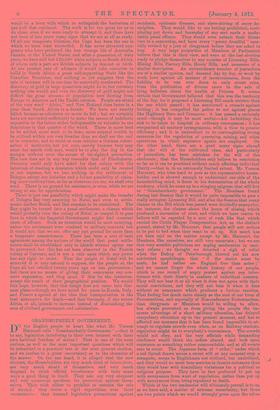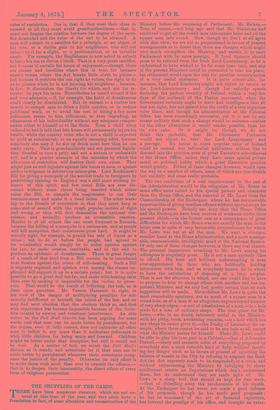GRANDMOTHERLY GOVERNMENT.
DO the English people at heart like what Mr. Vernon Harcourt calls '• Grandmotherly Government "—that is to say, legislation interfering in their own interest with their own habitual freedom of action ? That is one of 'the most curious, as well as the most important questions which will be submitted to a practical test at the next general election, and we confess to a great uncertainty as to the character of the answer. On the one hand, it is alleged that the new electors, the Householders, are very mach tired of laissez-faire, are very much afraid of themselves, and very much disposed to think official interference with their usual ways a good thing in itself. They ask, say very eloquent and very numerous speakers, for protection against them- selves. They wish either to prohibit or restrain the sale of alcohol ; they desire a rigid supervision over their amusements ; they demand legislative precautions against accidents, epidemic diseases, and slave-driving of every de- soription. They would like to see betting prohibited, card- playing put down, and horseplay of any sort made a mode- rately penal offence. They would even submit their litera- ture to a censorship, and have every "penny dreadful" care- fully revised by a jury of clergymen before they are asked to buy. A very large proportion of Members of Parliament believe that this is their view, and were at the last election ready to pledge themselves to any number of Licensing Bills, Mining Bills, Factory Bills, Hours' Bills, and measures of a similar description. An extraordinary number of journalists are of a similar opinion, and demand day by day, or week by week, laws against all manner of inconveniences, from the liability to be run over down to early street cries, from the publication of divorce cases to the sale of lying bulletins about the health of Princes. It seems certain that Government believed that this was the tendency of the day, for it proposed a Licensing Bill much stricter than the one which passed ; it has sanctioned a crusade against betting ; it has compelled the police to act against places like Highbury Barn and-Cremorne ; it has passed a curiously cruel—though it may be most useful—Act forbidding the sick to be taken to hospital in ordinary conveyances ; it has reorganised all sanitary arrangements, with a view to greater efficiency ; and it is understood to be contemplating strong measures for the regulation of quarrying, mining, and other operations in which explosive agents are employed. On the other hand, there are a good many signs abroad that the will of the cultivated class, and particularly of journalists, has been mistaken for the will of the electorate ; that the Householders only believe in restriction so far as it can be practised without much affecting individual liberty,—that is, to an extremely limited extent. Mr. Vernon Harcourt, who tries hard to pose as the representative house- holder, and is shrewd enough to understand one side of the householding mind, is fierce in his denunciation of the whole tendency, which he sums up in a stinging epigram that will live as "Grandmotherly government." The Members found during last Session that it would be quite impossible to pass a really stringent Licensing Bill, and after the Session that many clauses in the Bill which was passed were decidedly unpopular, for instance, the clauses about the hours of closing, which produced a succession of riots, and which we have reason to believe will be repealed by a sort of rush like that which carried the Cattle Plague Compensation Act, on the distinct ground, stated by Mr. Harcourt, that people will not endure to be put to bed when they want to sit up. Not much has yet been said on the matter except by Mr. Harcourt, for Members, hire ourselves, are still very uncertain; but we see that very sensible politicians are urging moderation in sani- tary reform ; we &ought we detected a' sigh of relief when the Bishop of Peterborough blurted out his now celebrated apophthegm, that "if the choice must be made, he had rather see England free than sober ;" 'and we cannot forget the whole history of oar people, which is one record of angry protest against any inter- ference with their liberty in matters of individual concern. They will not bear it at all when it does not agree with their moral convictions, and they will not bear it when it does without an annoyance which produces a furious reaction. That feeling lies much more closely as the root of our form of Protestantism, .and especially of Nonconformist Protestantism, than clergymen or Ministers would be willing to allow, has always prevented us from giving the people -the im- mense advantage of It short military education, has delayed compulsory education up to the present moment, and has so affected our manners that it has been found impossible to at- tempt to regulate crowds even when, as on Railway stations, regulation might be to everybody's convenience. The crowds would not obey, and the very officials while demanding obedience would think the orders absurd, and look upon resistance as something rather commendable, and at all events sure to occur. The Japanese form of "order," under which a red thread drawn across a street will at any moment stop a stampede, seems to Englishmen not civilized, but uncivilized, and they would no more bear sentries in theatre entrances than they would bear with domiciliary visitations for a, political or religious purpose. They have in fact preferred to put up with annoyances from want of regulation, rather than put up with annoyances from being regulated to death.
Which of the two tendencies will ultimately prevail is to us, as we have said, a matter of extreme uncertainty, but there are two points which we would strongly' press upon the advo- cates of restriction. One is, that if they want their ideas to sussed at all they must avoid granclmotherliness,—that is, must not despise the relation between the degree of the sacri- fice demanded and the value of the end to be attained. A man will submit to a sacrifice for a principle, or an object of his own, or a visible gain to his neighbours, who will not submit to it for a slight, or a problematical, or an invisible result. For example, the Englishman is now asked to submit to leave his inn at eleven o'clock. That is a very great sacrifice, not because it curtails his hours of enjoyment,—though there are classes and localities where this is true, for instance county towns, where the Act breaks little clubs to pieces— but because it restricts the one right he values, the right to do as he pleases when he is not injuring his neighbour ; because, in fact, it diminishes the liberty for which, and not for re- straint, he pays his taxes. Nevertheless he would submit if the end were adequate,—if, for example, the habit of drunkenness could clearly be diminished. But to submit to a curfew law merely to compel men to drink a little quicker, or to reduce publicans' work, or to avoid the cost of hiring a few more policemen, seems to him ridiculous, or even degrading, an effacement of his individuality without any adequate compen- sation either to himself or to the State. Even a child when ordered to bed is told that late hours will permanently injure his health, while the country voter who is not a child is expected to yield as submissively to an equally annoying edict, because somebody else may if he sits up drink more beer than he can easily carry. That is grandmotherly and not paternal legisla- tion, directed to cure a petty and not a serious or undeniable evil, and is a precise example of the mistakes by which the advocates of restriction will destroy their own cause. They might just as well legislate against late hours at once, or against undue indulgence in deleterious mince-pies. Lord Buckhurst's Bill for giving a monopoly of the acrobat trade to foreigners by prohibiting training in England was a still more striking in- stance of this spirit, and few social Bills are ever dis- cussed without some clause being inserted which either ruins the Bill, or compels the magistrates to use their common-sense and make it a dead letter. The other warn- ing to the friends of restriction is, that they must keep in some sort of accord with the rough popular motion of right and wrong, or they will first demoralise the national con- science, and secondly, produce an irresistible reaction. Murder is of all crimes the one most frequent in Barmah, because the killing of a mosquito is a serious sin, and as people will kill mosquitos, their consciences grow hard. It might be morally right, for example, to punish the sale of liquor as a crime ; but to do so before the people had agreed to its criminality would simply be to enlist opinion against the law, to make evasion creditable, and in the end to produce an epidemic of drunkenness. There is great danger of a result of that kind from a Bill certain to be introduced next Session against the crime of wife-beating. Such a Bill is urgently required, and opinion even among the classes im- plicated will support it up to a certain point ; but it is quite possible to go a great deal too far, and make wife-beating safer than ever by making it impossible for the victim to prose- cute. That would be the result of inflicting the lash, as is done upon garotters. Mr. Vernon Harcourt is right in his view of the danger of multiplying penalties for acts morally indifferent or beneath the notice of the law, and we may find next election that the electors think so, and that wise supervision has become impossible because of the irrita- tion created by unwise and vexatious interference. An able writer in the Pall Mall Gazette has been arguing for some weeks past that men can be made better by punishment, but the dogma, even if fully correct, does not authorise all other men to inflict it, any more than it authorises policemen to whip little children for being saucy and froward. Children might be better under that discipline, but still it would not be wise. As a matter of fact, we reject the Pall Mall's dictum as it stands, and 'substitute for it that men can be made better by punishment whenever their conscience recog- nises the justice of the penalty. Otherwise its only effect is to make them wish more than ever to commit the offence,— that is, to deepen their immorality, the direct effect of every form of religious persecution.











































 Previous page
Previous page